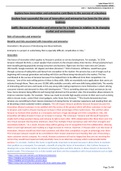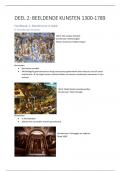Ethics Book Notes
Chapter 1 – Doing the Right Thing
Standard case for unfettered markets rests on two claims:
1. Markets promote the welfare of society as a whole by providing incentives for people to work hard
supplying the goods that other people want.
Welfare is not only about economic prosperity, but also about noneconomic aspects of social
well-being.
2. Markets respect individual freedom; rather than impose a certain value on goods and services,
markets let people choose for themselves what value to place on the things they exchange.
One of the great questions of political philosophy: Does a just society seek to promote the virtue of its
citizens? Or should law be neutral toward competing conceptions of virtue, so that citizens can be free to
choose for themselves the best way to live?
Aristotle teaches that justice means giving people what they deserve. In order to determine who deserves
what, we have to determine what virtues are worthy of honor and reward.
Aristotle: we can’t figure out what a just constitution is without first reflecting on the most desirable way
of life. Law can’t be neutral on questions of the good life.
Modern political philosophers principles of justice that define our rights should not rest on any
particular conception of virtue, or of the best way to live.
A just society respects each person’s freedom to choose his or her own conception of the good life.
Ancient theories of justice start with virtue, while modern theories start with freedom.
What virtues are worthy of honor and reward?
What way of life should a good society promote?
Thinking about justice seems inescapably to engage us in thinking about the best way to live.
Hard questions about society distribution begin when we ask what people are due, and why?
We’ve identified three ways of approaching the distribution of goods:
- Welfare;
- Freedom;
- Virtue.
Each of these ideals suggests a different way of thinking about justice.
We think that prosperity makes us better off than we would otherwise be – as individuals and as a society.
Prosperity matters, in other words, because it contributes to our welfare.
- Utilitarianism: seek the greatest happiness for the greatest number.
Around the world, the idea that justice means respecting certain universal human rights is increasingly
embraced.
Approach to justice that begins with freedom hard-fought political arguments take place between two
rival camps:
- Laissez-faire camp lead by the free-market libertarians who believe that justice consists in
respecting and upholding the voluntary choices made by consenting adults.
, - Fairness camp contains theorists of a more egalitarian bent. They argue that unfettered markets
are neither just nor free. In their view, justice requires policies that remedy social and economic
disadvantages and give everyone a fair chance at success.
We sometimes think of moral reasoning as a way of persuading other people. But it is also a way of sorting
out our own moral convictions, of figuring out what we believe and why.
Plato: to grasp the meaning of justice and the nature of the good life, we must rise above the prejudices
and routines of everyday life.
Chapter 8 – Aristotle
What qualities are worthy of honour?
What virtues deserve recognition and reward?
Central to Aristotle’s political philosophy are two ideas:
1. Justice is teleological. Defining rights requires us to figure out the telos (the purpose, end, or
essential nature) of the social practice in question.
2. Justice is honorific. To reason about the telos of a practice – or to argue about it – is, at least in part,
to reason or argue about what virtues it should honor and reward.
He believes that debates about justice are, unavoidably, debates about honor, virtue, and the nature of the
good life.
For him, justice means giving people what they deserve, giving each person his or her due.
Justice involves two factors: things, and the persons to whom things are assigned.
Equality of distribution depends on what we are distributing, and on the virtues relevant to those things.
Justice discriminates according to merit, the relative excellence.
In distributing flutes, we should not look for the richest or best-looking or even the best person overall.
We should look for the best flute player.
The most obvious reason for giving the best flutes to the best flute players is that doing so will produce the
best music, making us listeners better off. But this is not Aristotle’s reason. He thinks that the best flutes
should go to the best flute players because that’s what flutes are for – to be played well.
It’s also true that giving the best instruments to the best musicians will have the welcome effect of
producing the best music, which everyone will enjoy – producing the greatest happiness for the greatest
number (utilitarian consideration).
Aristotle: teleological reasoning. He claims that in order to determine the distribution of a good, we have
to inquire into the telos/purpose of the good being distributed.
Aristotle’s point: arguments about justice and rights are often arguments about the purpose/telos of a
social institution, which in turn reflect competing notions of the virtues the institution should honor and
reward.
For Aristotle, distributive justice was not mainly about money but about offices and honors.
He reminds us that all theories of distributive justice discriminate. The question is: which discriminations
are just?
, For him, the purpose of politics is not set up a framework of rights that is neutral among ends. It is to form
good citizens and to cultivate good character.
Aristotle criticizes what he takes to be the two major claimants to political authority:
1. Oligarchs: they, the wealthy, should rule.
2. Democrats: free birth should be the sole criterion of citizenship and political authority.
Each has a claim, but only a partial claim.
Both exaggerate their claims, because both misconstrue the purpose of political community.
Aristotle rejects that the purpose of politics is to satisfy the preferences of the majority (democrats).
For him, politics is about learning how to live a good life.
The purpose of politics is nothing less than to enable people to develop their distinctive human capacities
and virtues – to deliberate about the common good, to acquire practical judgment, to share in self-
government, to care for the fate of the community as a whole.
If the political community exists to promote the good life, what are the implications of the distribution of
offices and honors?
Aristotle reasons from the purpose of the good to the appropriate way of distributing it:
“Those who contribute most to an association of this character” are those who excel in civic virtue, those
who are best at deliberating about the common good. Those who are greatest in civic excellence – not the
wealthiest, or the most numerous, or the most handsome – are the ones who merit the greatest share of
political recognition and influence.
According public recognition to those who display civic excellence serves the educative role of the good
city.
These days, we generally view politics as a necessary evil, not an essential feature of the good life.
Why can’t we live perfectly good, virtuous lives without politics?
The answer lies in our nature. Only by living in a polis and participating in politics do we fully realize our
nature as human beings. Aristotle sees us as beings “meant for political association, in a higher degree than
bees or other gregarious animals.” The reason he gives is this: Nature makes nothing in vain, and human
beings, unlike other animals, are furnished with the faculty of language. Other animals can make sounds,
and sounds can indicate pleasure and pain. But language, a distinctly human capacity, isn’t just for
registering pleasure and pain. It’s about declaring what is just and is unjust, and distinguishing right from
wrong. We don’t grasp these things silently, and then put words to them; language is the medium through
which we discern and deliberate about the good.
Only in political association, Aristotle claims, can we exercise our distinctly human capacity for language,
for only in a polis do we deliberate with others about justice and injustice and the nature of the good life.
Individuals, families and clans existed before cities did; but only in the polis are we able to realize our
nature.
The moral life aims at happiness, but by happiness Aristotle doesn’t mean what the utilitarians mean –
maximizing the balance of pleasure over pain. The virtuous person is someone who takes pleasure and
pain in the right things.
- Happiness is not a state of mind but a way of being, “an activity of the soul in accordance with
virtue.”
“We become just by doing just acts, temperate by doing temperate acts, brave by doing brave acts.”
Chapter 1 – Doing the Right Thing
Standard case for unfettered markets rests on two claims:
1. Markets promote the welfare of society as a whole by providing incentives for people to work hard
supplying the goods that other people want.
Welfare is not only about economic prosperity, but also about noneconomic aspects of social
well-being.
2. Markets respect individual freedom; rather than impose a certain value on goods and services,
markets let people choose for themselves what value to place on the things they exchange.
One of the great questions of political philosophy: Does a just society seek to promote the virtue of its
citizens? Or should law be neutral toward competing conceptions of virtue, so that citizens can be free to
choose for themselves the best way to live?
Aristotle teaches that justice means giving people what they deserve. In order to determine who deserves
what, we have to determine what virtues are worthy of honor and reward.
Aristotle: we can’t figure out what a just constitution is without first reflecting on the most desirable way
of life. Law can’t be neutral on questions of the good life.
Modern political philosophers principles of justice that define our rights should not rest on any
particular conception of virtue, or of the best way to live.
A just society respects each person’s freedom to choose his or her own conception of the good life.
Ancient theories of justice start with virtue, while modern theories start with freedom.
What virtues are worthy of honor and reward?
What way of life should a good society promote?
Thinking about justice seems inescapably to engage us in thinking about the best way to live.
Hard questions about society distribution begin when we ask what people are due, and why?
We’ve identified three ways of approaching the distribution of goods:
- Welfare;
- Freedom;
- Virtue.
Each of these ideals suggests a different way of thinking about justice.
We think that prosperity makes us better off than we would otherwise be – as individuals and as a society.
Prosperity matters, in other words, because it contributes to our welfare.
- Utilitarianism: seek the greatest happiness for the greatest number.
Around the world, the idea that justice means respecting certain universal human rights is increasingly
embraced.
Approach to justice that begins with freedom hard-fought political arguments take place between two
rival camps:
- Laissez-faire camp lead by the free-market libertarians who believe that justice consists in
respecting and upholding the voluntary choices made by consenting adults.
, - Fairness camp contains theorists of a more egalitarian bent. They argue that unfettered markets
are neither just nor free. In their view, justice requires policies that remedy social and economic
disadvantages and give everyone a fair chance at success.
We sometimes think of moral reasoning as a way of persuading other people. But it is also a way of sorting
out our own moral convictions, of figuring out what we believe and why.
Plato: to grasp the meaning of justice and the nature of the good life, we must rise above the prejudices
and routines of everyday life.
Chapter 8 – Aristotle
What qualities are worthy of honour?
What virtues deserve recognition and reward?
Central to Aristotle’s political philosophy are two ideas:
1. Justice is teleological. Defining rights requires us to figure out the telos (the purpose, end, or
essential nature) of the social practice in question.
2. Justice is honorific. To reason about the telos of a practice – or to argue about it – is, at least in part,
to reason or argue about what virtues it should honor and reward.
He believes that debates about justice are, unavoidably, debates about honor, virtue, and the nature of the
good life.
For him, justice means giving people what they deserve, giving each person his or her due.
Justice involves two factors: things, and the persons to whom things are assigned.
Equality of distribution depends on what we are distributing, and on the virtues relevant to those things.
Justice discriminates according to merit, the relative excellence.
In distributing flutes, we should not look for the richest or best-looking or even the best person overall.
We should look for the best flute player.
The most obvious reason for giving the best flutes to the best flute players is that doing so will produce the
best music, making us listeners better off. But this is not Aristotle’s reason. He thinks that the best flutes
should go to the best flute players because that’s what flutes are for – to be played well.
It’s also true that giving the best instruments to the best musicians will have the welcome effect of
producing the best music, which everyone will enjoy – producing the greatest happiness for the greatest
number (utilitarian consideration).
Aristotle: teleological reasoning. He claims that in order to determine the distribution of a good, we have
to inquire into the telos/purpose of the good being distributed.
Aristotle’s point: arguments about justice and rights are often arguments about the purpose/telos of a
social institution, which in turn reflect competing notions of the virtues the institution should honor and
reward.
For Aristotle, distributive justice was not mainly about money but about offices and honors.
He reminds us that all theories of distributive justice discriminate. The question is: which discriminations
are just?
, For him, the purpose of politics is not set up a framework of rights that is neutral among ends. It is to form
good citizens and to cultivate good character.
Aristotle criticizes what he takes to be the two major claimants to political authority:
1. Oligarchs: they, the wealthy, should rule.
2. Democrats: free birth should be the sole criterion of citizenship and political authority.
Each has a claim, but only a partial claim.
Both exaggerate their claims, because both misconstrue the purpose of political community.
Aristotle rejects that the purpose of politics is to satisfy the preferences of the majority (democrats).
For him, politics is about learning how to live a good life.
The purpose of politics is nothing less than to enable people to develop their distinctive human capacities
and virtues – to deliberate about the common good, to acquire practical judgment, to share in self-
government, to care for the fate of the community as a whole.
If the political community exists to promote the good life, what are the implications of the distribution of
offices and honors?
Aristotle reasons from the purpose of the good to the appropriate way of distributing it:
“Those who contribute most to an association of this character” are those who excel in civic virtue, those
who are best at deliberating about the common good. Those who are greatest in civic excellence – not the
wealthiest, or the most numerous, or the most handsome – are the ones who merit the greatest share of
political recognition and influence.
According public recognition to those who display civic excellence serves the educative role of the good
city.
These days, we generally view politics as a necessary evil, not an essential feature of the good life.
Why can’t we live perfectly good, virtuous lives without politics?
The answer lies in our nature. Only by living in a polis and participating in politics do we fully realize our
nature as human beings. Aristotle sees us as beings “meant for political association, in a higher degree than
bees or other gregarious animals.” The reason he gives is this: Nature makes nothing in vain, and human
beings, unlike other animals, are furnished with the faculty of language. Other animals can make sounds,
and sounds can indicate pleasure and pain. But language, a distinctly human capacity, isn’t just for
registering pleasure and pain. It’s about declaring what is just and is unjust, and distinguishing right from
wrong. We don’t grasp these things silently, and then put words to them; language is the medium through
which we discern and deliberate about the good.
Only in political association, Aristotle claims, can we exercise our distinctly human capacity for language,
for only in a polis do we deliberate with others about justice and injustice and the nature of the good life.
Individuals, families and clans existed before cities did; but only in the polis are we able to realize our
nature.
The moral life aims at happiness, but by happiness Aristotle doesn’t mean what the utilitarians mean –
maximizing the balance of pleasure over pain. The virtuous person is someone who takes pleasure and
pain in the right things.
- Happiness is not a state of mind but a way of being, “an activity of the soul in accordance with
virtue.”
“We become just by doing just acts, temperate by doing temperate acts, brave by doing brave acts.”











